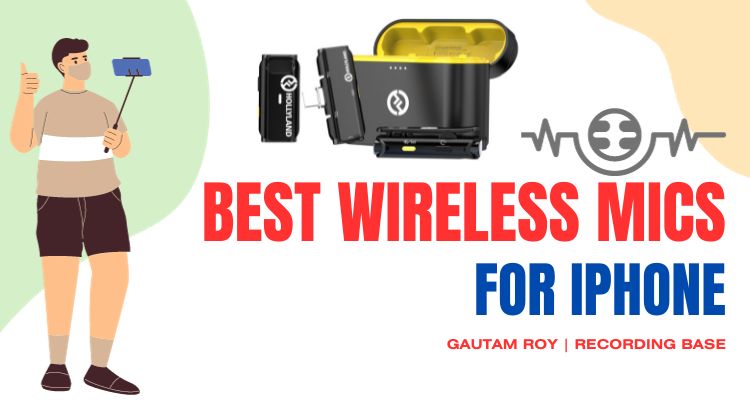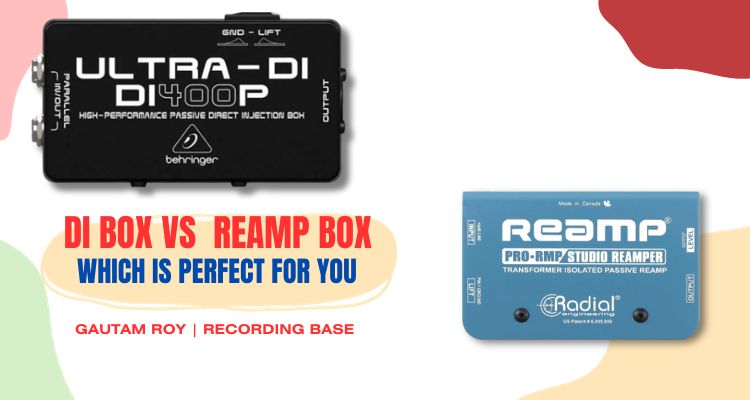In this article, you will read about the best bass guitar mics for recording bass guitar in your home studio.
Recording bass can be a nightmare, especially if you’re not playing it in an isolated environment.
If you’ve been recording bass guitar for years using the mic you had at the time, you know that the result can be a terrible-sounding and unusable track. That’s because not all mics are designed to handle the sheer volume of a bass guitar.
No point putting thousands of dollars into a premium bass guitar and amp if you don’t have the right microphone.
In this guide, we’ll show you some of the best mics for recording bass guitar that will capture all the low-frequencies you’ll ever need.
Whether you’re a professional music producer or a hobbyist musician looking to GO BIG, these mics are a must-have for your recording gear arsenal.
You might also like,
- Drum Mics 101: Best Drum Mics and Kits, Types, Placements, FAQ
- Top 10 Best Audio Interface for Streaming Under $200 in 2024
Best Microphones for Recording Bass Guitar
Electro-Voice RE20

Key Features:
Disclosure: This post may contain affiliate links, which means we may receive a commission if you click a link and purchase something that we recommended. Read more about Affiliate disclosure here.
- True cardioid with no coloration at 180-degrees off-axis
- Variable D design
- Steel case and humbucking coil
- Bass roll-off switch
Electro-Voice RE20 is the gold standard for recording bass guitars. With the Electro-Voice RE20, you can finally get professional-quality recordings of your bass guitar with all the low frequencies you ever wanted.
The RE20 uses EV’s patented “Variable D” design which is very effective in minimizing the proximity effect. This means you can mount it against a bass cabinet and you won’t get that excessive boominess. It captures low-frequency sounds just as well as high-frequency sounds, which is essential for bass guitars.
The RE20’s build quality can probably survive decades of extreme use. It uses a massive steel housing coupled with a humbucking coil. This ensures that the mic is immune to any magnetically induced noise and hum.
There’s only one downside. As much as it’s perfect for bass, it’s not particularly good for something like acoustic guitar or cymbals. Being a moving-coil dynamic mic, it isn’t very ideal for transient-heavy sources.
But if your budget is sub-$500, then the EV RE20 is a very easy product to recommend. It blows other similarly-priced condenser or ribbon microphones out of the water.
Pros:
- Excellent background noise rejection
- Can capture a huge amount of low end with most sources
- Resistant to Electromagnetic Interference
- Sounds better than most sub-$500 microphones
Cons:
- Not suitable for transient-heavy sources
- A little bulky
Shure SM57
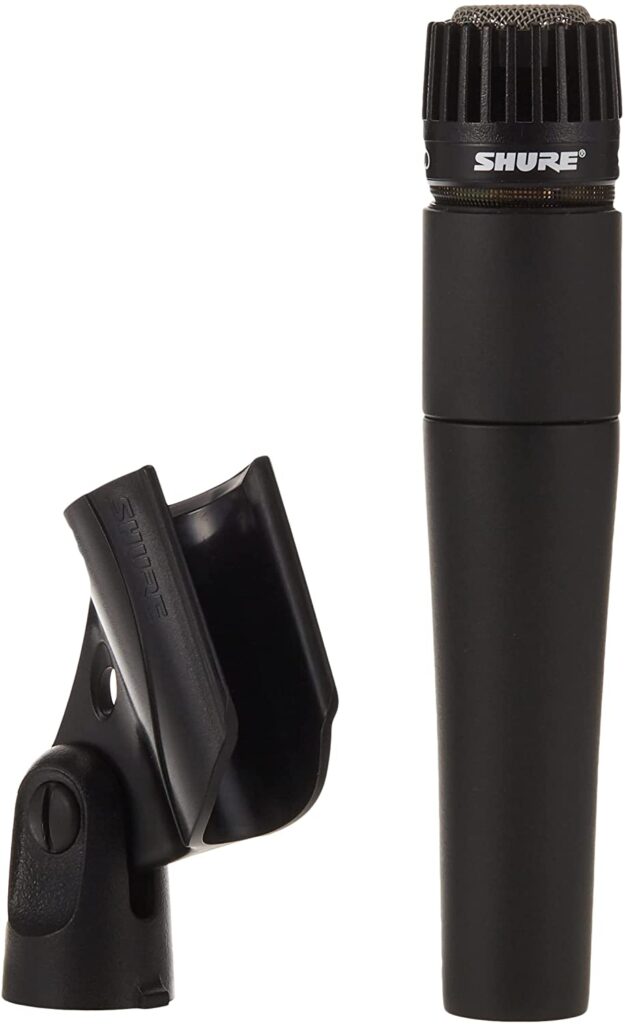
Key Features:
- Tight cardioid polar pattern
- Frequency response 40 to 15,000 Hz
- Suitable for close-miking of amps and speakers
If you’re a little tight on cash and struggling to find that perfect microphone for recording bass, then the Shure SM57 is the best microphone for your budget.
The Shure SM57 is the long-standing industry standard for live performance and studio recording. And that’s solely because of two reasons: it sounds great and is built to last. No matter your situation, from jazz to rock to metal, this microphone will have you covered.
It will give you all those bass frequencies that most $500 mics can offer, for a lot less. With a tight cardioid polar pattern and extremely natural frequency response, it’s perfectly equipped for your next recording session or even lives performances.
The Shure SM57 can’t be beaten! With a price tag of only $100, you get professional quality sound. The best part is that it’s a dynamic microphone. That means no need for phantom power! Plus, it’s super light and durable.
Pros:
- Superb value for money
- Works well with both guitar and bass amps
- Easy to use for even beginners
- Great build-quality for its price
Cons:
- Not very good for vocals
AKG D112 MkII
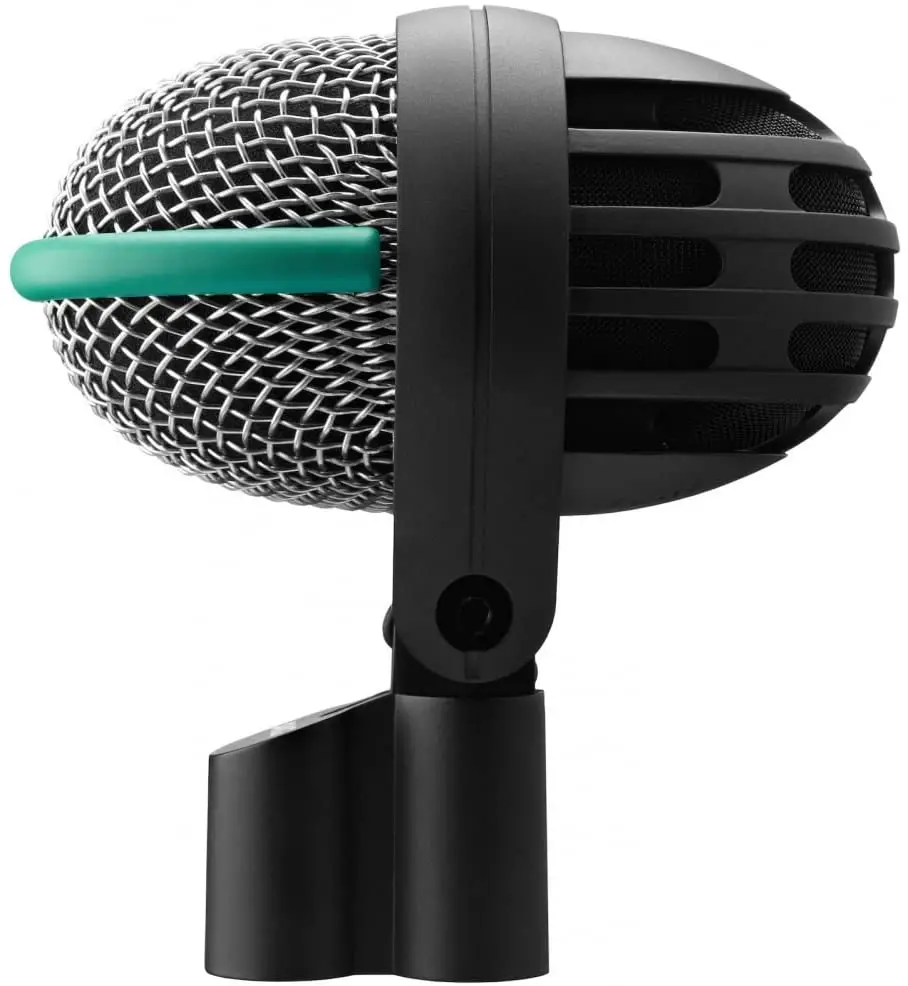
Key Features:
- Highly flexible mount
- Max. SPL 160dB
- Large-diaphragm technology
- Integrated hum-compensation coil
The AKG D112 MkII is the perfect example of how you don’t need to break the bank to get a premium sound! AKG is one of the most trusted and respected brands in the music industry, and their D112 MkII Bass Mic is used by all kinds of musicians as a standard for bass miking.
Made from high-quality materials, the D112 MkII is a durable mic that can take any signal you throw at it. If you want high-quality sound at a reasonable price, this is the mic for you.
The new diaphragm is designed to get those juicy sub-100Hz frequencies without losing any mid-range. The best part is that you can use this mic not only with bass cabinets but other brass instruments like trombones and tuba. But no matter the use-case, you’ll be impressed with its tight and punchy bass sound.
It has a max SPL rating of 160 dB and is specially engineered to have excellent low-frequency response even with super-heavy signals. If you need a professional-sounding bass track, this mic will provide you with the sound and performance you need.
Pros:
- Perfect for any bass instrument – bass guitars, kick drums, trombones etc.
- Much improved flexible mount design
- Very high SPL capability
- Tight and punchy sub-100Hz frequencies
Cons:
- Can be a little tricky to set up
Sennheiser MD 421-II
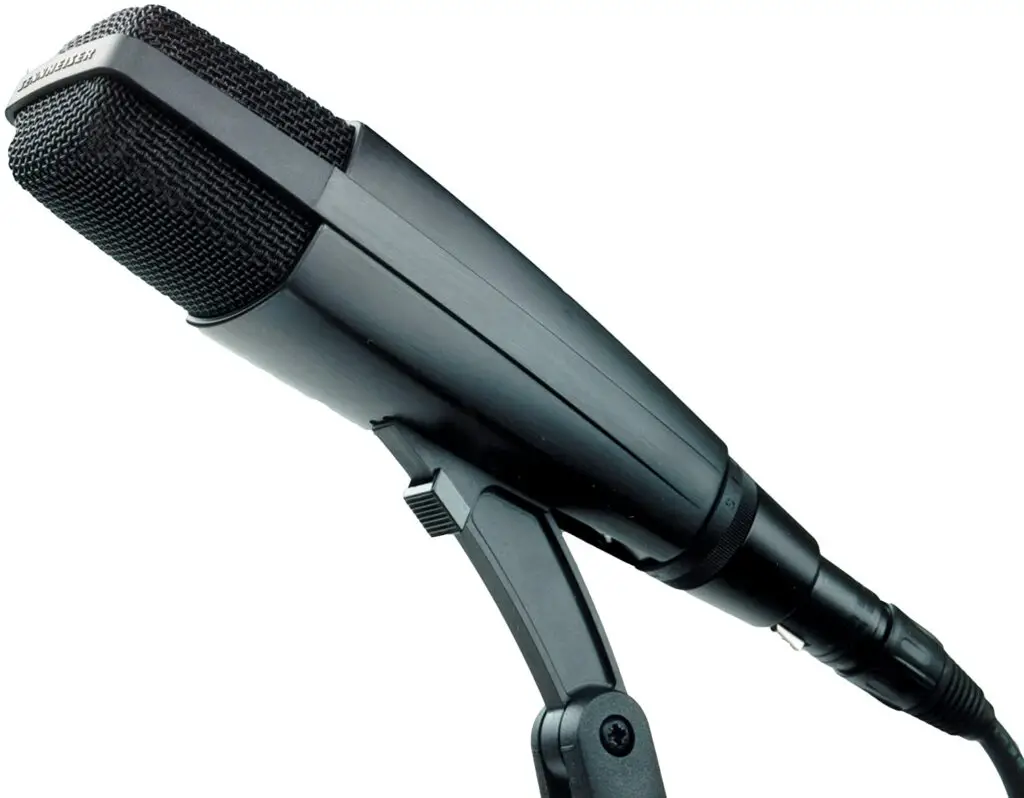
Key Features:
- Glass composite housing and hardened stainless steel basket
- Effective feedback rejection
- 5 position bass roll-off switch
- Frequency response 30Hz–17kHz
- Dust and humidity resistant
The MD 421-II is one of Sennheiser’s most popular mics. Not only that, with so many features to offer, it’s one of the most diverse microphones out there.
It’s a cardioid mic, which eliminates major feedback issues. And with the five selectable bass roll-off settings, most of the problems related to the proximity effect won’t happen. You can easily use the MD 421-II in close-miking situations and still get a clean, clear response with no unnatural bass boost.
It’s built like a tank, with a glass composite housing and hardened stainless steel basket. It also uses the best components to ensure you’ll be able to rely on it for years to come. You’ll never have to deal with the hassle of mics that break down after just a few years. You’ll feel confident using our mic for any job.
But it’s not just a good microphone for recording bass, it’s super versatile. Whether you’re a podcast host, voice actor, singer-songwriter, or just want to sound great on camera, the MD 421-II will help you achieve your goals. This mic is a great value-priced entry to the world of professional audio capture.
Pros:
- Professional sound quality
- Sleek design
- Very durable hardened steel construction
- 5-position bass roll-off switching
- Very versatile
Cons:
- A little pricey
- The clip can feel wobbly at times
Shure BETA 52A
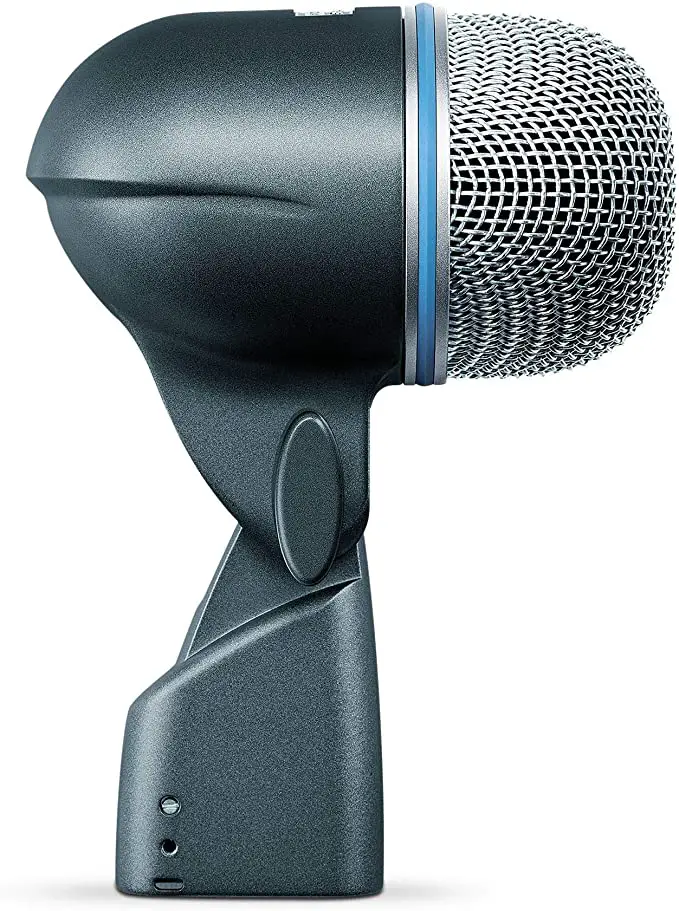
Key Features:
- Supercardioid pickup pattern
- Hardened steel mesh grille
- Advanced pneumatic shock mount system
- Handles up to 174dB SPL
The Shure BETA 52A has a very special place in the bass industry. Just like the AKG D112, it was made specifically to handle low-frequency signals.
Everyone knows the importance of getting your bass to cut through the mix. But sometimes, even if you’re playing with the best bass amp and studio monitors in the world, you can still get that sinking feeling when your bass just doesn’t sound like it’s got enough power.
That’s when you need a mic like Shure BETA 52A Supercardioid Mic, calibrated for all types of bass instruments, from kick drums to electric bass guitars. Its unique frequency response goes from 20Hz to 10KHz with a boost at 4KHz.
You’ve got to hear your bass! And this mid-range presence boost exactly does that.
It’s designed to handle 174dB SPL which is enough for most sources. Another thing that’s usually found on premium mics is off-axis sound rejection for a clean and isolated sound. Get the Shure BETA 52A Bass Mic and you’ll be hearing everything you never knew you were missing, with crystal-clear sound quality.
Pros:
- Great sound even when recording in high-volume situations
- Unique locking stand adapter that simplifies setup
- Frequency response shaped for low frequency sources
- Great quality and reliability
Cons:
- Not the best high-end; Ideally use with additional direct track
Tips for Recording Bass Like a Pro
Invest In a Good Bass Amp
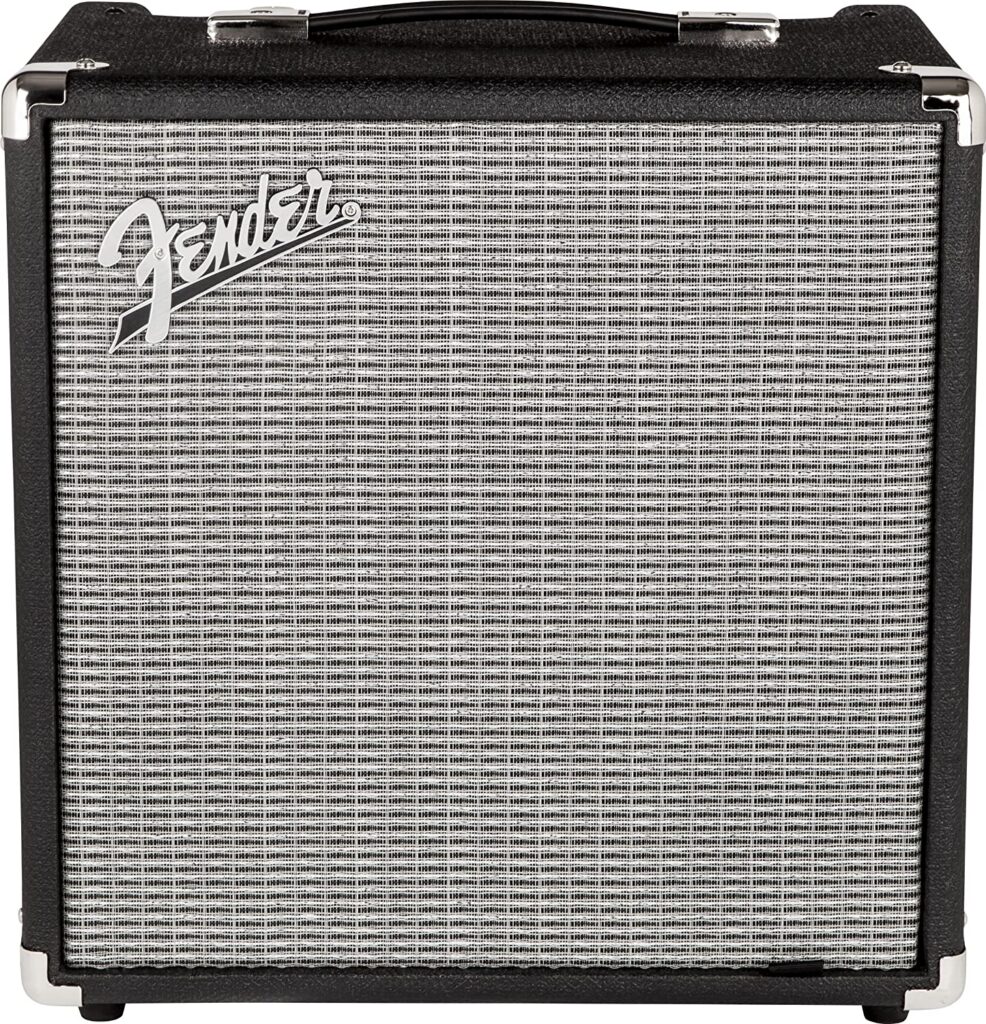
This is a no-brainer! You can’t hear the bass without an amp, so getting a good one is the way to go.
But with so many options in the market, you need to make sure you get the right one for your needs. Some amps are better for certain jobs than others.
Do you need a warm vintage sound? An amp like Ampeg B-15 will work wonders for you. Maybe you need a deep and rich tone which a Hartke Kickback can provide or something cheap and reliable like the Fender Rumble series.
The choice of amp matters more than you think to get the desired sound, almost as much as having the right bass matters.
Blend In the DI
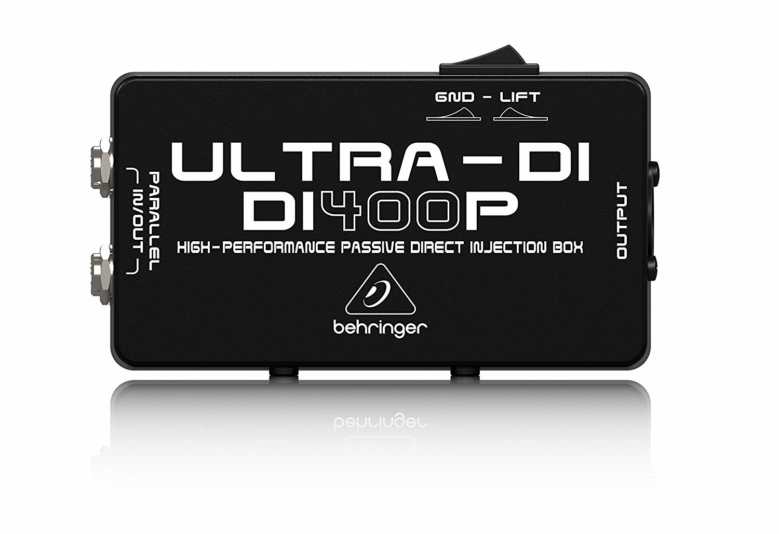
Here’s the thing:
Even if you buy the most expensive mic in the world, there will be some frequencies that the mic won’t pick up due to your overall setup, ambiance, and various other external factors.
That’s where having a console or interface helps a lot!
Where the mic will capture the growl and grit from the amp, the DI signal will give you those clean deep tones making your sound nicer and fuller. In fact, a lot of musicians only use a DI’d signal on its own. While that might sound okay, it will lack the character and richness of an amp recording.
Even a cheap interface like Focusrite Scarlett 2i2 or Behringer U-Phoria UMC22 will do the job perfectly fine. Just be aware of the correct instrument-level and software-level gain settings.
If you don’t have any extra cash right now to get a DI, you may be in luck. A lot of bass amps have a Direct Output that can give a decent tone, although not as great as a dedicated DI.
Read also,
Don’t Mess With The Mix
Mixing starts even before the bass signal enters your DAW. It starts at the instrument level.
Before doing anything with the software, use the EQ on your bass and amp controls to tweak the sound.
Now, before throwing a bunch of plugins on the track, you need to understand that the mixing techniques vary vastly across different genres and styles.
Pop and R&B producers sometimes like to put some chorus on the bass, it sweetens up the sound. Similarly, Rock and Hard Rock music requires the bass to have more mid-range to be heard among those screaming guitars.
Also, here are a few other general techniques you can use to take your bass sound to the next level:
- The most popular EQ technique is to tone down the 250Hz-ish frequencies. That’s where most of the muddiness of bass (and often the whole mix) is.
- On the other hand, if you think the bass lacks presence or can’t really cut through the mix, try boosting the spectrum around 3KHz – 5KHz.
- Use gentle compression settings, maybe a 4:1 or lower ratio. Try experimenting with slower attack times.
Final Thoughts and Verdict
This brings our article to a close. I hope it was a helpful read.
It’s not that hard to get a high-quality bass recording without spending a bucketful of cash. All you need is the right equipment to begin with and some really basic recording techniques.
To summarize, the Electro-Voice RE20 is the best bass recording mic if you’re willing to invest in a premium mic. But if you need an inexpensive and reliable amp, you can’t go wrong with the Shure SM57.
For getting the best of both worlds, pair these mics with a DI or preamp signal and you’ll have the most awesome-sounding bass tracks ever.
You might also like,

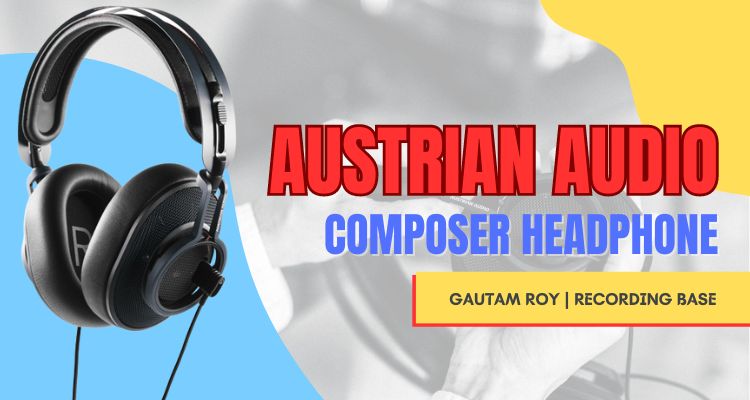
![Heritage Audio i73 PRO Series Audio Interfaces Review [2024]](https://www.recordingbase.com/wp-content/uploads/2024/01/Heritage-Audio-i73-pro-series.jpg)
